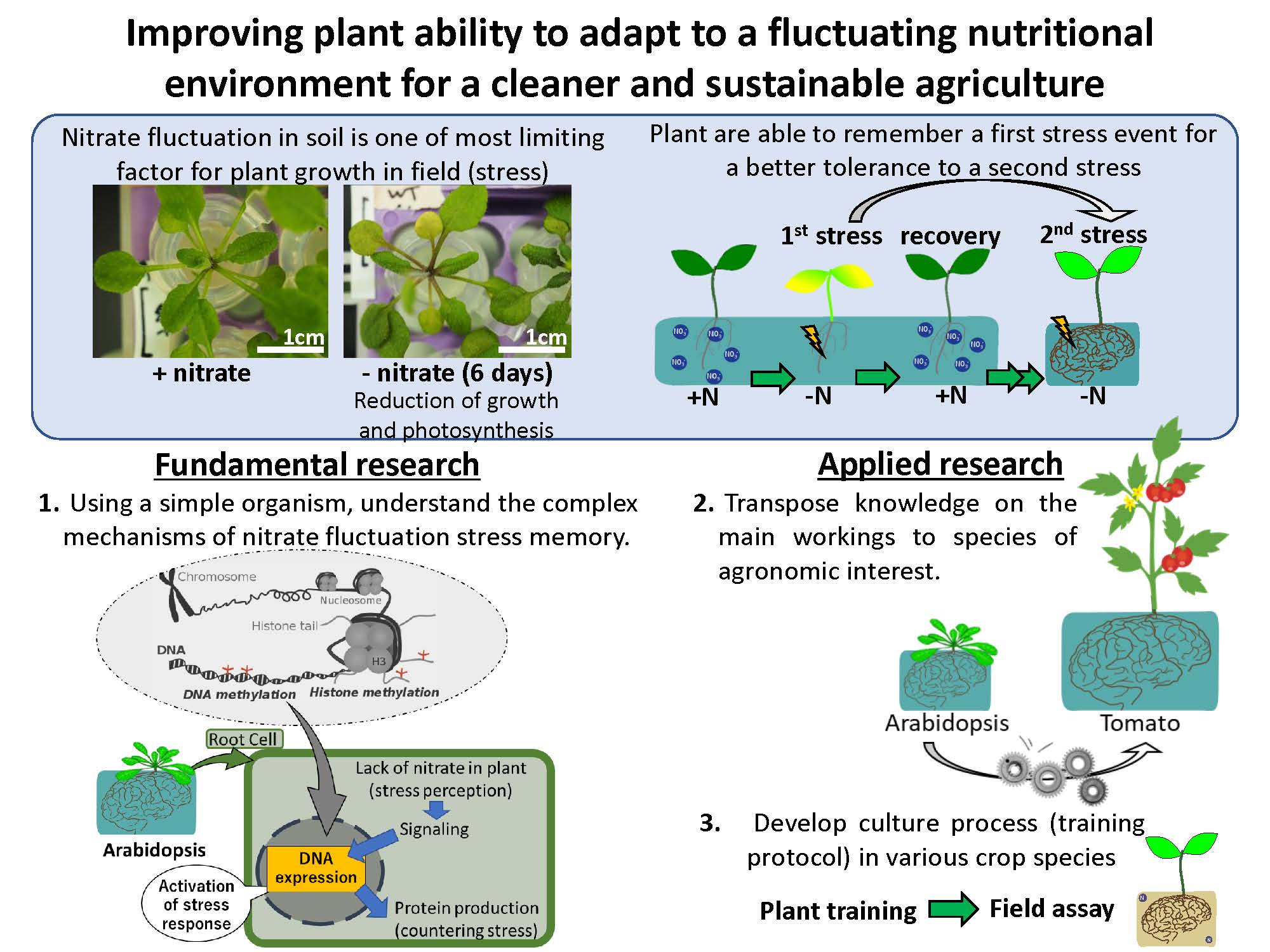Plant nutrition
Hormone biosynthesis
Epigenetic
Abiotic stress

BELLEGARDE Fanny
Starting year 2023
Nagoya University
Institute for advanced research / Graduate School of Bioagricultural Sciences
YLC designated assistant professor
Research fields
Research Interests
Plant adaptation and memory
Nitrate fluctuation stress
Cytokinin regulation
Nitrogen nutrition
Professional Memberships
Japanese Society of Plant Physiologists
Main research topics
Nitrate is the main source of nitrogen in natural and agricultural system. However, it is heterogeneously distributed in soil and is easily leached by rainfall. As a consequence, crops are continuously subjected to fluctuating nitrate stresses, impacting yield. To overcome this, fertilizers are massively employed but plants absorb only 30-40% of the fertilizer applied around them. The rest is released to the environment causing major environmental problems, such as water eutrophication and the production of greenhouse gas. Improving plants ability to adapt to a fluctuating nitrate environment is therefore key for sustainable agriculture.
Recent publications have shown that epigenetic modifications play a vital role in plant adaptation to stresses and can constitute a stress-induced environmental memory. These modifications occur on histone proteins or DNA without any changes in the DNA sequence. They impact the accessibility to DNA information, permitting plant plasticity to various constraints. For biotic and some abiotic stresses, it has been shown that a first exposure to a stress (called priming) can permit a stronger or a faster response to a second exposure. It is only recently that a link with epigenetic regulations has been made, although the underlying mechanisms are still not understood.
The purpose of my project is to elucidate mechanisms by which plants are able to remember a past nitrate starvation stress event for a better tolerance to a future longer stress, by the study of molecular, hormonal and physiological changes during repeated nitrate fluctuation stress. My research focuses first on the model plant Arabidopsis, as tool of explorative research, to understand how this memory is set, and connect epigenetic regulation with tolerance to nitrate fluctuation stress. Then, this knowledge will be directly use to guide more finely the research on more complex organisms (crop species), first on tomato and then on a larger number of varieties.
After improvement of pre-culture process for crops species memory setting (first stress training), I will evaluate their agronomic performance in field. This will require collaborative partners, first with crops specialist but also with electrophysiologist for pre-culture design and optimization. In a longer extend, I intend to develop training protocols in various species to improve crops tolerance to nitrate fluctuation stress which could be use by nursery to sold optimized seedlings. To do so, collaboration with engineers and economist would permit to evaluate the cost-benefits of crop process automation in nursery company.

Representative papers
Bellegarde F., Maghiaoui A, Boucherez J, Krouk G, Lejay L, Bach L, Gojon A, Martin A (2019). The chromatin factor HNI9 and ELONGATED HYPOCOTYL 5 maintain ROS homeostasis under high nitrogen provision. Plant Physiol. 180(1): 582-592
Fanny Bellegarde, Olivia Tjahjono, Mika Yoshino-Kida, Takatoshi Kiba, Miki Shibutani, Mei Kuriyama, Louis J. Irving, Mikiko Kojima , Kazuki Miyata and Hitoshi Sakakibara. (2025) Fluctuations in nitrate availability impact cytokinin biosynthesis through histone modifications of IPT3 in Arabidopsis roots for growth acclimation. Plant Commun. 101531. doi: 10.1016/j.xplc.2025.101531.
Research URL
researchmap https://researchmap.jp/F.Bellegarde_R.Map
ORCID https://orcid.org/0000-0001-7221-5033
Laboratory Website https://www.agr.nagoya-u.ac.jp/~ck/en/sakakibara.html
Global issues to be solved through this project
Improving plant ability to adapt to a fluctuating nutritional environment for a cleaner and sustainable agriculture
Between soil impoverishment and global warming, the instability of agricultural yields is constantly increasing. It is now crucial to develop less polluting and more sustainable agricultural methods by improving our understanding of the natural adaptation of plants to their environment through the mechanisms of expression of genetic information contained in DNA.
In this context, uncovering the memory mechanisms of plant stresses will allow the development of culture processes as preliminary training for the establishment of plant memory in the nursery company before the crops are sold for field use.
Such training to acquire tolerance to a fluctuating nutrient environment would maximize plant growth and stabilize yield while reducing fertilizer input and its negative impact on the environment.
Interview
No interview

